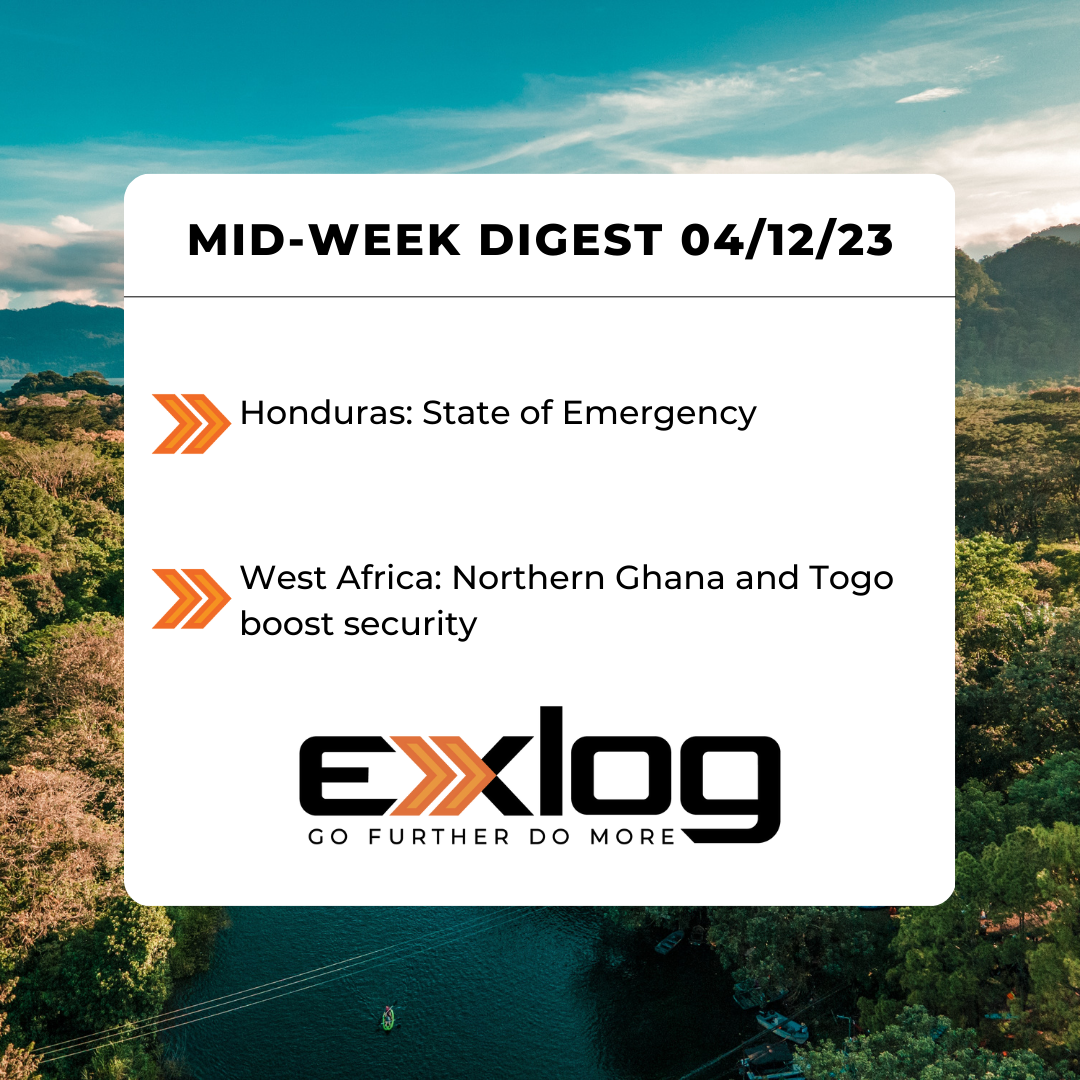State of Emergency in Honduras and Northern Ghana and Togo boost security
Honduras: State of Emergency extended for third time amid high crime
As part of an ongoing anti-gang initiative, Honduran President Xiomara Castro and her administration have once again extended a state of emergency in many parts of the country. Originally enacted on Dec. 7, 2022, the order is now slated to expire on May 21, 2023. The state of emergency, which applies to 123 of 298 local districts, temporarily suspends various rights, including citizens’ freedom of movement and assembly, and grants police more latitude to conduct searches and make arrests without judicial backing. Additional reported measures include police placing emergency cameras and severely restricting the sale of SIM cards and chips for mobile phones. There has been no indication of police imposing a curfew. Opponents of the state of emergency extension have criticized the scope of the restrictions, decrying them as a violation of human rights. UN Human Rights Council representatives expressed concern over the use of recurring states of emergency, calling instead for a comprehensive security policy emphasizing prevention and investigation. In contrast, police officials contest that this latest extension will allow them greater capacity to combat the most pressing crime issues in the country, including extorsion, assassination, drug trafficking, and money laundering; they also point to successes under previous states of emergency, such as the arrest of more than one hundred members of local criminal organizations, including some with links to MS-13 and Barrio 18. However, precedent suggests that the continued use of forceful tactics under a protracted state of emergency raises the possibility of gang retaliation against government, military, and police targets. For instance, during a 2012 state of emergency, members of MS-13 and Barrio 18 attacked military checkpoints, resisted government-imposed curfews, and even set fire to a bus in Tegucigalpa, killing 18 people. Possible gang retaliation entails a risk of collateral injury, especially to the local civilian population, as well as potential disruptions to overland travel in impacted areas.
West Africa: Ghana, Togo increase security near Burkina Faso border
A recent increase in cross-border militant activity in northern regions of Ghana and Togo has prompted authorities in both countries to boost security measures aimed at preventing or reducing spillover violence from neighboring Burkina Faso. Togo has observed an escalation in the frequency of successful and thwarted attacks by Al Qaeda-aligned groups near the frontier with Burkina Faso since November 2021. The deadliest such attack occurred on Feb. 10, when suspected militants kidnapped and executed more than 30 civilians in the Kpendjal Prefecture, Savanes Region. On April 6, the Togolese National Assembly approved a renewed 12-month State of Emergency (SoE) across Savanes. The move is an extension of measures that have been in place since June 2022, one month after the first confirmed extremist attack in Togo. According to local media reports, the SoE grants security forces additional “flexibility” to counter worsening instability on the northern border. Unlike its neighbors, Ghana has not experienced any confirmed Islamist attacks in its territory; however, the attempted bombing of a bridge on Feb. 5 and an April 3 incident in which unidentified assailants shot at immigration officers (killing one person) have reinforced fears over the presence of armed groups in the Bawku area near the Burkinabe border. The Ghanaian government deployed an additional 1,000 special forces personnel to the Upper East Region in the immediate aftermath of the gun attack. The northern border area has long been the site of tense tribal dynamics, banditry, smuggling, and illegal mining operations, and local authorities warn of militants recruiting new members in this permissive and lucrative environment. Similar dynamics exist across much of West Africa and have been exploited by criminal and terrorist networks for over a decade. The deteriorated security environment is highly evident in Burkina Faso, where armed groups reportedly control 40% of the national territory. In 2022, the country suffered more than 300 terrorist attacks – incurring 50% more fatalities compared to the previous year – as well as two military coups fueled in large part by dissatisfaction with the government’s inadequate response to the ongoing terrorism threat. Under new military leadership, Burkinabe security forces are currently executing a “dynamic offensive” against armed groups in the country, which reportedly includes actions in cooperation with neighboring states. However, the complex and entrenched nature of militancy in Burkina Faso suggests that these security operations will almost certainly be insufficient to reverse the trend of worsening regional insecurity in the near-to-medium term.


